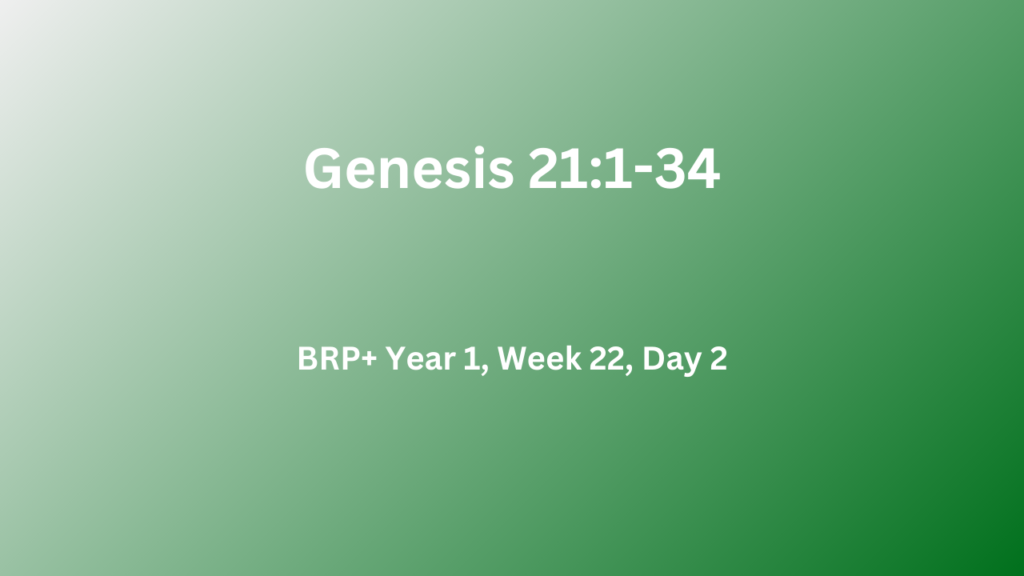Genesis 21:1-34
Q.1. How old were Abraham and Sarah when Isaac was born? What was the significance of his name? Why did Abraham circumcise him? How did Sarah respond? – (Gen.21:1-7 c.f. Gen.17:17-19; 18:10-14; Gal.4:21-31; Heb.11:11-12)
Sarah was at least ninety, and Abraham one hundred years old when Isaac was born (see Gen.17:17; 18:10-14; 21:5). The writer of Hebrews highlighted – 11 By faith even Sarah herself received ability to conceive, even beyond the proper time of life, since she considered Him faithful who had promised. 12 Therefore there was born even of one man, and him as good as dead at that, as many descendants as the stars of heaven in number, and innumerable as the sand which is by the seashore (Heb.11:11-12). The child of Sarah speaks of freedom, and the child of Hagar speaks of bondage (see Gal.4:21-31). God gave Isaac his name before he was even conceived. It means ‘he laughs’, which is how the people responded after Sarah gave birth to him (see Gen.17:19; 21:6-7). The sign God had given to Abraham to identify the covenant people, was circumcision. Consequently, Abraham circumcised Isaac after eight days (see Gen.21:4 c.f. Gen.17:9-14).
Q.2. Why did Abraham send Hagar and Ishmael away? How did God show His compassion for Hagar and her son? What promise did He confirm to her? – (Gen.21:8-21 c.f. Gen.16:7-12)
Sarah had already expressed her jealousy of Hagar. This illustrated that God’s creation principle of ‘one man with one woman’ is the least problematical (see Gen.16:3-6 c.f. Gen.2:21-24 c.f. Mt.19:4-6). On the very day when Sarah weaned Isaac, and Abraham celebrated with a feast, Ishmael mocked Isaac in a way that distressed Sarah. Abraham was eighty-six when Ishmael was born and one hundred when Isaac was born. Isaac was probably around two years old when he was weaned, so Ishmael’s mocking was like bullying from a teenager (see Gen.21:9 c.f. Gen.16:16; 21:5). Abraham loved Ishmael, so was greatly distressed by Sarah’s suggestion to – … “Drive out this maid and her son, for the son of this maid shall not be an heir with my son Isaac” (Gen.21:10). However, God stepped in and directed Abraham – … “Do not be distressed because of the lad and your maid; whatever Sarah tells you, listen to her, for through Isaac your descendants shall be named (Gen.21:12). The great patriarch had to defer to his wife, and trust God to work out His purposes with Ishmael. The parting must have been a painful lesson to Abraham. The conditions were harsh for Hagar and Ishmael, and again the Lord extended His compassion to Hagar. The Bible records that God responded to the lad’s plaintiff cries (see Gen.21:17). God repeated the promise that He had made to Hagar earlier, and rescued them – 18 … I will make a great nation of him.” 19 Then God opened her eyes and she saw a well of water; and she went and filled the skin with water and gave the lad a drink (Gen.21:18-19). This historical incident had a more significant gospel application explained by the apostle Paul in Galatians 4:21-31).
Q.3. Who was Abimelech? Why did the king want to make a covenant with Abraham? How did the men resolve their dispute about the water well? How was Abraham’s faith in God growing? – (Gen.21:22-34 c.f. Gen.20:2 & 15)
Abimelech was king of Gerar, situated near the coast, across from the Dead Sea. God had warned him of the serious consequences of innocently taking Sarah as one of his wives (see Gen.20:1-18). However, it had become obvious to Abimelech that Abraham had a special bond with God – …”God is with you in all that you do (Gen.21:22). He then sought to make a covenant with Abraham – … that you will not deal falsely with me or with my offspring or with my posterity, but according to the kindness that I have shown to you, you shall show to me and to the land in which you have sojourned” (Gen.21:23). Abraham was meek, perhaps timid, and only then raised a dispute over a water well (see Gen.21:25-26). To ensure a good water supply, Abraham added seven ewe lambs as a witness to his ownership of the well of Beersheba – the well of oath … well of seven (see Gen.21:28-31). Abraham’s relationship with God was developing, as he accepted the fact that God’s promises would extend beyond his lifetime, and had been secured by Adonai, the Everlasting God – Abraham planted a tamarisk tree at Beersheba, and there he called on the name of the Lord, the Everlasting God (Gen.21:33). In reality, Abraham – … was looking for the city which has foundations, whose architect and builder is God … 13 All these died in faith, without receiving the promises, but having seen them and having welcomed them from a distance and having confessed that they were strangers and exiles on the earth. 14 For those who say such things make it clear that they are seeking a country of their own. 15 And indeed if they had been thinking of that country from which they went out, they would have had opportunity to return. 16 But as it is, they desire a better country, that is, a heavenly one. Therefore, God is not ashamed to be called their God; for He has prepared a city for them (Heb.11:10, 13-16).

